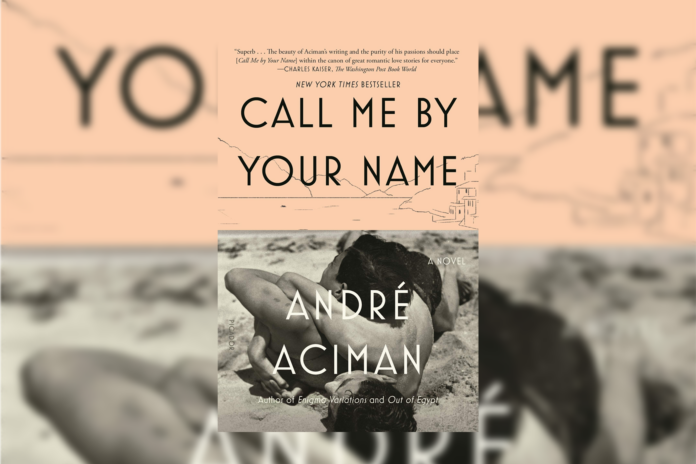
I have been putting off reading for a while and have just now started getting through my never-ending TBR (to be read) list. But after putting it off for months, I eventually read a book that I had been looking forward to since I acquired it last year. This extraordinarily poignant book, which addresses desire, identity, and self-discovery, left a lasting impression.
I was transported to the sun-drenched environment of 1980s Northern Italy as I immersed myself in André Aciman’s “Call Me by Your Name,” a voyage into the depths of passion, identity, and self-discovery. This book is a tribute to the eternal power of love and desire, connecting strongly with my experiences as a writer, a homosexual man, and someone who values the subtleties of literature.
My initial encounter with this story was with the film adaptation that released when I was in high school, a time when the throes of infatuation I was feeling at the time for a boy, added a layer of excitement, which mirrors the central themes of the story.
My personal feelings were strongly reflected in the movie, which piqued my interest and made me want to read the book. I’ve now finished this literary voyage, which was both astonishingly similar to the movie and, at times, different, bringing new viewpoints and nuances that the movie couldn’t entirely portray.
André Aciman’s “Call Me by Your Name” is a beautifully crafted novel that delves into the complexities of young same-sex companionship and obsessive love. The prose is a work of art, with every word carefully selected to evoke vivid, emotionally charged images. Aciman’s prose, beautifully intoxicating, is akin to a fine Italian wine that matures with every page turned.
The desire and longing of seventeen-year-old Elio for twenty-four-year-old Oliver, a summer visitor at his parents’ Italian estate, is the beating core of the story. The Italian Riviera’s cliffs serve as the ideal location for a story of this kind. Readers can become lost in the daydreams of an ideal existence in 1980s Northern Italy because of Aciman’s skill with description.
The characters, notably Elio, are so well-developed that they feel like old friends and family. The author’s ability to craft a world where readers can emotionally invest in the characters is a testament to his literary prowess. As a writer, I couldn’t help but admire the author’s ability to create a world where readers can fully invest in the characters, making their journey all the more poignant.
One quote from the book has stayed with me: “We rip out so much of ourselves to be cured of things faster than we should that we go bankrupt by the age of thirty and have less to offer each time we start with someone new. But to feel nothing so as not to feel anything – what a waste!”
This quote encapsulates will likely resonate with people who are familiar with the vulnerability and sacrifice that love demands. This concept is exemplified by Elio’s journey, as he makes his way through the complex web of lust, desire, and longing.
The main character, Elio, acts as a mirror, reflecting the experience of many readers. His persona captures the nature of infatuation, a state that occasionally errs on the side of passion and love. Your body will feel like a million suns are going supernova after reading Aciman’s story.
“Call Me by Your Name” encapsulates what I’ve come to understand as “queer loneliness.” It’s the profound sense of yearning, watching others engage in clichéd romances while waiting for your own moment, often feeling like it may never come. It’s about holding onto those precious slivers of intimacy, cherishing them when they do come even if only for a short time.
While the story immerses us in Elio’s perspective, there’s an undeniable desire for me to glimpse into his lover Oliver’s mind. But this narrative decision just strengthens our bond with Elio and emphasizes the depth of his adoration. Aciman skillfully builds the workaround for Elio’s deepest thoughts and nuanced emotions to create a personal an intense tale of love and lust.
Near the end of the novel, Elio’s father becomes a significant point of reflection. His monologue (as quoted above) resonates with profound wisdom. These words were something I didn’t realize I needed to hear, and they will long stay imprinted in my mind, since I have always tried to obtain my father’s acceptance of my sexuality.
“Call Me by Your Name” is a timeless work of literature that leaves an indelible mark. It transports readers to the enchanting world of Northern Italy. It etches itself into your memory, setting the standard for excellently written literature and serving as a reminder of the beauty and complexity of human desire and connection.
In the end, “Call Me by Your Name” is not just a novel; it’s an experience. It’s a story that will continue to resonate with me and, I believe, with anyone who is lucky enough to read it. Once you finish reading, you’ll be yearning to escape to that villa in Northern Italy.
For comments/questions about this story, DM us on Instagram @thewhitatrowan or email thewhit.opinioneditor@gmail.com.





